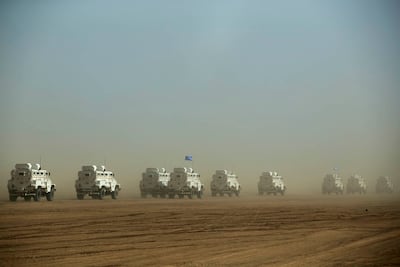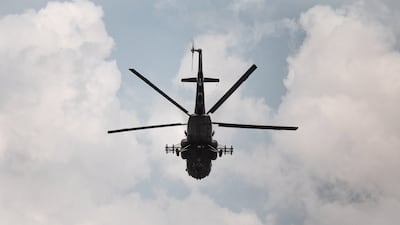A Malian army helicopter fired several rockets “close to” British members of a UN peacekeeping force in the country, the UK Ministry of Defence and the UN said.
The incident was the first of its kind between Mali, backed by Russian forces, and UN peacekeepers, a UN source told AFP.
“We are aware of a recent incident in Mali in which rockets were fired by a Malian Armed Forces helicopter close to a detachment of UK personnel,” an MoD spokesman said.
“All UK personnel are safe and accounted for, and the circumstances surrounding this incident are being investigated,” he said.
It took place in the area of Tessit, near Gao city, about 950 kilometres north-east of Bamako, the capital.
According to a diplomatic document seen by AFP, the Malian army helicopter fired six rockets.
The document said almost all Malian helicopters are flown by Russians with Malian co-pilots.
The statement questioned whether several contingents of the United Nations Multidimensional Integrated Stabilisation Mission in Mali (Minusma) could remain if Russian troops were involved.
Last week, Richard Mills, the US deputy ambassador to the UN, criticised an “unacceptable” incident on March 22, when a Malian helicopter “fired rockets near peacekeepers in eastern Mali".
UN spokesman Stephane Dujarric on Tuesday said an investigation into the events was under way.
A team from the UN peacekeeping mission in Sudan is ready to go to Moura in central Mali as soon as the authorities allow access by air to the area, he said.
According to another diplomat, paramilitaries from the Russian company Wagner are suspected to have been involved in this incident alongside the Malian army.
France and other western nations denounced the Malian authorities' alleged use of the Russian private security group. The Malian authorities said they do not use mercenaries.
Mali a hotbed of extremism
Mali is the epicentre of an insurgency that began in the north in 2012 and spread three years later to neighbouring Niger and Burkina Faso.
Thousands of people across the region have died, and about two million have been displaced.
Attacks have been carried out by groups claiming affiliation with Al Qaeda or ISIS, but many civilian casualties have also been caused by so-called self-defence forces.
Minusma arrived in the sub-Sahara state in 2013.
It has 16,500 personnel, mostly troops, plus police and civilians, according to its website.
The UN said the mission has suffered the most fatalities of any of its peacekeeping operations, with hostile acts resulting in 159 deaths as of October 31.

Mali's army has been accused of carrying out a massacre in the central town of Moura in March, with the participation of Wagner mercenaries.
Human Rights Watch said Malian forces and foreign fighters killed 300 civilians in Moura, in what it called “the worst single atrocity reported in Mali's decade-long armed conflict".
Minusma's mandate ends in June. Several contributor countries are reviewing their troops' participation in the light of recent developments in Mali.
The EU on Monday decided to halt its military training missions in Mali but will keep a presence in the sub-Sahara.

